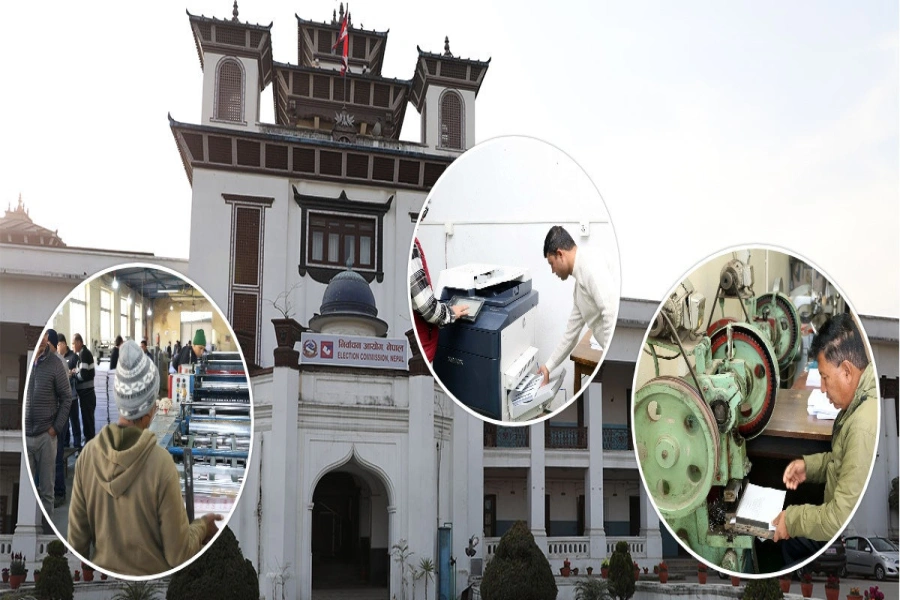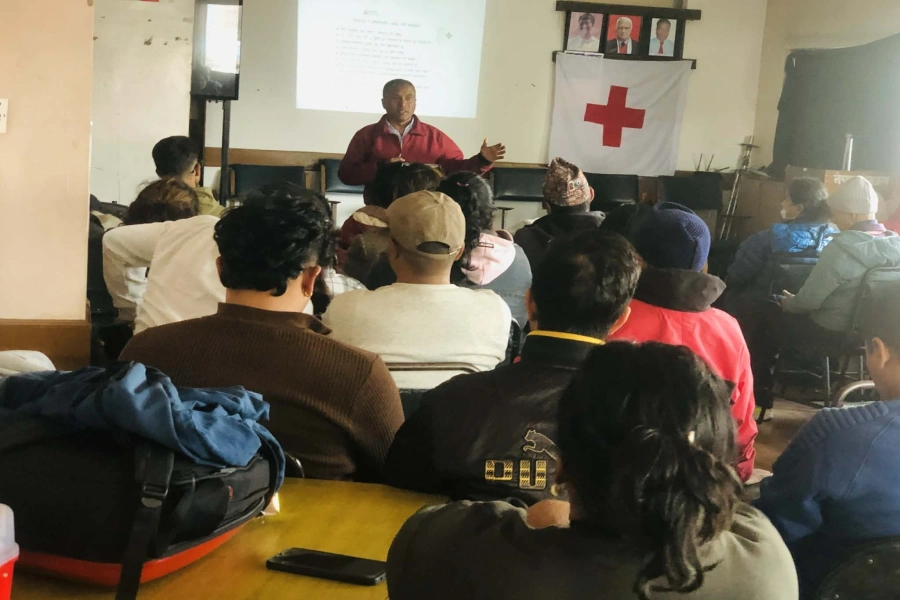Nowadays, most brides do not bother to cry. This trend has turned a joke less hilarious which mentions that brides cry and grooms laugh for the last time during their marriage
Piety defines farmers who lead a humble and spiritual life without being aware of it. Such a life attuned to the rhythm of nature and changing seasons is extremely surreal to those who make all kind of hypes and hooplas on the virtues of natural living from cozy living rooms of marbled buildings in the concrete jungles of cities.
Most of us are gearing up for a cold weather and monotonous work schedule with all major festivals behind. However, the farmers in the hills are preparing for a grand celebration at sacred rivers using the remaining flowers which had not fully blossomed before Dashain and Tihar.
It’s amazing to see the farmers bidding adieu to the last of flowers in style. Most of the big flower-blossoms (thunga) are used to weave giant festoons designed to be hung over and across the sacred rivers on the day of Ekadashi: 11th lunar day in the bright fortnight (shukla paksha) of the Hindu month of Kartik preceded by a ritual worship accompanied by auspicious sound of conches blown by skilled priests, participating villagers enacting Lila (divine play) and dancing to the tune of khainjadi (tambourine).
Many small flower-blossoms are used to decorate jagiya (pavilion for fire-ceremony and worship) while the rest are put in a doli (litter: made of cloth hung on pole for carrying) to be ferried to the rivers. The conveyors of litters (filled with festoons and flowers) are led by a troupe of artistes playing panchai baja: an ensemble of traditional musical instruments comprising jhyamta (cymbals), two damaha (one-headed large drum), narsingha (trumpet), sanai (clarinet), and tyamko/dholak (two headed hand-drum).
Food and delicacies in Monsoon edition Brand Nepal 2022 Carniva...

Imagination of youth
This musical flower procession runs riots in the imagination of the marriageable boys and girls. Every girl who joins the procession feels carried away by an overwhelming imagination of being put in the doli as a bride with a veil around it. Nowadays, most brides do not bother to cry, as was the case with most of the brides of yesteryears. This trend has turned a joke less hilarious which mentions that brides cry and grooms laugh for the last time during their marriage.
Every boy in the flower procession pictures himself trailing the doli with an umbrella unfurled over him as a means of protection from the sun and rain. Hence, a fair weather marriage is the dream of boys. They love the sight of the bystanders/onlookers jostling to catch their glimpse on the way to/from their soulmates’ home. But a scorching sun or a soaking rain can spoil this privilege when people in the procession carry umbrellas. Therefore, boys and girls in the country side are advised against licking spoons, bowls, and plates to avoid storms during their marriages.
The most spectacular festoon hanging ceremony begins when the doli procession reaches destination and the worshippers take ritual baths by immersing their whole body in the sacred river. The muscular men march ahead to cross the river with one end of the festoon in their hand while the weaklings retreat for fear of falling into the cold water. They erect wooden poles on either side of the river and hang the festoons. And boom, the river looks like a gorgeous girl wearing multiple flowers braids.
The carnival goers on both sides of the river keenly observe and compare the size, length and color vibrancy of the festoons and feel jealous if their side is apparently outperformed and overshadowed. It’s all too human to be jealous of better performance and success of others. Our obsession with big things has rightly been termed megalomania.
I often climbed up a boulder to enjoy the fascinating views of the festoons hung across the river and the flowers flown onto it along with butter lamps on the leaf-plates, which danced southward to the ocean while most of my friends were busy tracking beautiful girls and cracking open jumbo raw peanuts to quell their hunger. Oftentimes, I stalked the stalkers surreptiously to study their eccentric behaviors. The dashing boys with bandanas on their heads were the brashest stalkers.
Renunciation was a painful choice. I had neither enough money to buy sufficient peanuts or oranges nor was I bold enough to face any girls if they swerved and accosted me. Instead, I chose to listen to the murmur of the sacred river that had hosted generations of my forefathers’ cremation on its banks. I believed our forefathers smiled from the heaven when the giant festoons are hung and small flower-blossoms poured onto the river as a tribute to them.
The groups of bandana-clad boys resorted to following and whistling to draw attention of girls and smacked their lips to prove their virulent manliness if any girls looked back at them. They aggressively peeled ripe oranges and squeezed the splish of the peels onto each other’s eyes while the girls giggled at their stupidity. Anyway, I thought most beautiful girls beamed like lotuses when they took ritual and ceremonial baths. Their feet shone like glossy pebbles when they frolicked in the water.
I was often preoccupied with the thought of Dwadashi (the day after Ekadashi) when a delicious dish called nwagi (made of new rice soaked in ripe banana, sugar and yogurt smoothie lightly sprinkled with black pepper powder to add flavor) was prepared. The first share of this annual delicacy was always offered to the deities in line with the agrarian culture no matter how impatient I was to eat it.
My restless imagination would fly beyond the hills and horizon while I was trying to savor the animated and dappled carnival crowds along the river. My parents had said they had buried the umbilical cords of all my siblings including mine near the fireplace as they wanted to make sure we returned home (read village) even if we went too far for studies and work obligations. They had also got our hair (upon shaving during the scared thread ceremony) thrown onto the waters of the Marsyangdi River hoping it would reach Banaras, one of the holiest places and Hindu pilgrim sites in India.
Belief and faith
According to Hindu belief, people reach the places where their hair reaches. Fortunately, I have also made it to Banaras as a pilgrim. The sun was rising on the horizon and the sand particles on the banks of the Ganges River were glistening like diamonds when I first reached the Manikarnika Ghat. That was a moment of divine grace and spiritual contentment. I think I met my God that day. Since then rivers have always inspired awe and ecstasy in me.
Every summer, my wild imagination wanders far into the deep ocean in search of my hair that must have arrived there with the waters of the Marsyangdi River whenever I visit the beaches along the Atlantic Ocean on eastern North Carolina.
We spend our life sandwiched between the conflicting calls of our hair (head) or umbilical cord (read stomach) and the heart. The heart keeps distracting us by flashing moments of juvenile joviality while the hair reminds us to score our existence first.
Our stomach is destined to listen to its distant neighbor (head) first. When it’s full, the organ beneath it rises from its deep slumber and prowls the carnival ground on the river banks. And it bundles the lovebirds fuller in a dark corner where they sigh, sob and scream under the cover of the susurration of the sacred river.




































